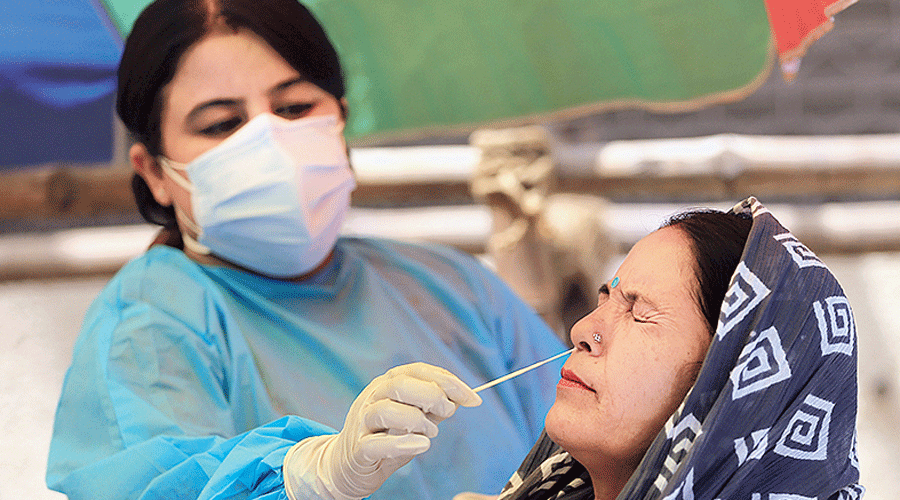A body of medics has called on fellow doctors and government agencies to acknowledge India’s largely safe status against existing coronavirus variants and avoid “scaremongering” lest the public disregard caution if and when a “real wolf” arrives.
The Organised Medicine Academic Guild (Omag), a body of 15 professional medical associations with a collective membership of 250,000 doctors, issued a statement on Saturday saying “science, sanity, and the support of people should prevail over scaremongering”.
The guild’s statement came after multiple calls for caution and enhanced preparedness by the Centre over the past week and a media release from the Indian Medical Association, the country’s largest body of doctors, warning about “an impending Covid-19 wave”.
“The fag-end of 2022 has become a season of health advisories followed by opinions and predictions of a fourth Covid-19 wave,” Omag said in the statement. “With attempts at scaremongering, people go into panic mode....”
India’s seven-day average of daily new Covid-19 cases has remained below 300 over the past month. The Union health ministry on Saturday reported 226 new cases. The count of active Covid-19 patients nationwide was 3,653, up from 3,552 on Friday.
“Amid a pandemic, alertness among the public and preparedness by healthcare institutions is always good,” said Ishwar Gilada, a physician and infectious disease specialist in Mumbai who is Omag’s secretary-general.
“But a spate of calls for caution and forecasts of an impending wave carry the risk of public disregard if and when a real wolf arrives.”
The IMA had on December 26, after a meeting with Union health minister Mansukh Mandaviya, issued a statement cautioning about “an impending Covid-19 outbreak” and saying that cases may “suddenly erupt” if “we are not adopting Covid-19-appropriate behaviour”.
The IMA also asked the public to “avoid unnecessary travel, including international travel”.
The IMA statement had surprised many doctors and health experts, some of whom said the advice against travel appeared inconsistent with official policy as no central health agency had recommended avoiding domestic or foreign travel.
An IMA office-bearer told this newspaper that the choice of words in the media release could have been better.
The Omag statement echoes what several top scientists and virologists have said over the past week — that India’s population is largely protected from the existing coronavirus variants, which are primarily siblings or sublineages of the omicron variant that caused India’s third wave in January 2022.
India’s advantages emerge from natural Covid-19 infections over the past two years that scientists believe affected over 90 per cent of the population, and high vaccination coverage with over 75 per cent of the adult population having received two doses and 28 per cent, three doses.
“Whether they’re BA.2 or its derivatives, including XBB or other known variants, they’re all sublineages of omicron which we know has been associated with mild symptoms and a need for hospitalisation in very few cases, mainly in those with underlying illnesses,” Gilada said.
The Union health ministry, citing growing Covid-19 counts in China and other countries, has over the past 10 days asked the public to adhere to precautions, such as using face masks and maintaining physical distancing. It has asked the states to enhance surveillance and hospital preparedness, and told labs to increase genome sequencing. It has also introduced Covid-19 tests for passengers arriving from some countries.
Medical researchers tracking genetic changes in the coronavirus have asserted that there is always a chance that the virus may acquire fresh mutations that could change it dramatically — to something as different as omicron was from delta, the virus that fuelled India’s horrific second wave in 2021.
“Could a dramatic change like that occur with mutations that make the virus more virulent? In principle, yes — but there is no evidence for that yet,” said Rajesh Karyakarte, the head of microbiology at the BJ Medical College, Pune, who leads Maharashtra’s sequencing efforts.
Another physician-turned-researcher said two scenarios were possible — one in which future variants cause slight surges in infections but not severe disease, and a second in which a significantly different new variant causes both surges and severe infections.
“Either of these two scenarios can be handled with clear strategies that focus on increased surveillance for early detection of changes, if any, in the hospitalisation patterns among Covid-19 patients, and continuous sequencing,” said the scientist, attached to a central research lab, who asked not to be named.
“Both can be done without fanfare. But what is happening is quite the contrary.”











